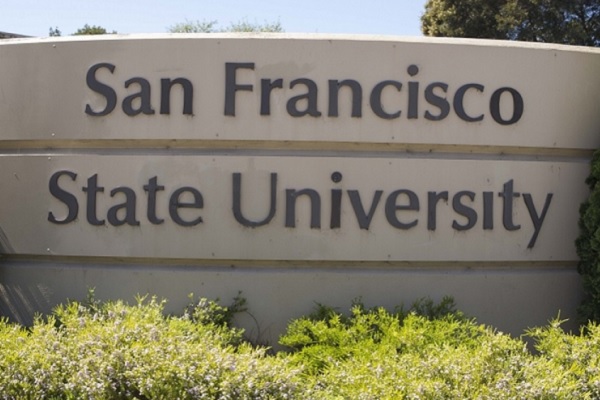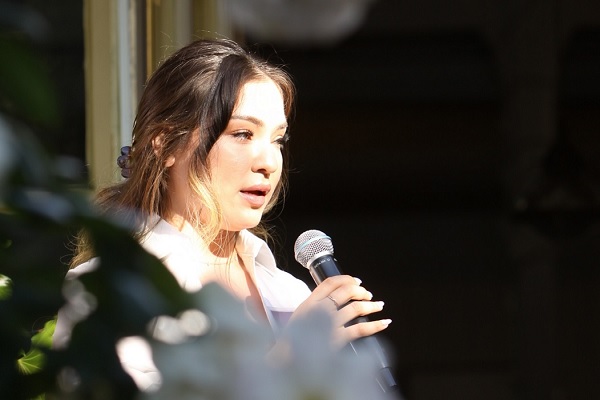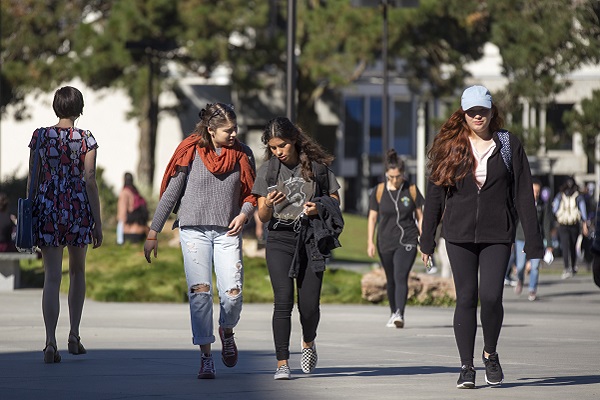News & Announcements

The committee tasked with identifying and appointing the next chancellor of the California State University (CSU) will hold a hybrid open forum on the campus of San Francisco State University from noon to 2 p.m. Thursday, Feb. 9. San Francisco State will host the forum in the McKenna Theatre of its Creative Arts Building.
The forum, which will also be livestreamed, will provide an opportunity for members of the CSU community to participate in person or virtually to share their thoughts about the qualities and experiences needed by the next chancellor. Two other forums — one at the Glenn S. Dumke Auditorium in Long Beach and another at CSU, Bakersfield’s Doré Theatre — will be held Feb. 7 and 8.
The forums are being held by the Implementation Committee for the Selection of the Chancellor, which has been appointed to work on a national search. Jolene Koester, former president of CSU Northridge, was named interim chancellor last March. Her appointment is expected to last between 12 and 15 months.
“The CSU chancellor is an important role with significant impact on our university and across our state,” said SF State President Lynn Mahoney. “This is an excellent opportunity for the SF State community and local communities to participate in this important process."
Registration is not needed to attend any of the forums in person or to observe virtually. Members of the CSU community will be able to provide in-person comment to the committee, but those who wish to provide comments virtually must register to do so in advance.
The Chancellor Search Forum Planning Committee welcomes persons with disabilities. Sign language interpreting (ASL) and captioning will be provided in-person at McKenna Theater; captioning will also be provided via livestream. Attendees in need of on-campus mobility transport should call the Disability Programs and Resource Center at (415) 338-2472 to request a ride. If you would like additional reasonable accommodations for this event, please contact the Office of the President at (415) 338-1381 or president@sfsu.edu as soon as possible so your request may be reviewed.

When she was 15 years old, Theresa Gamboa made a phone call that changed her life. It was a change for the better ... eventually. But it also led to consequences and chaos she had to deal with for years.
Gamboa’s call was to the police. She was reporting her father — a meth addict and gang member — for abuse.
Gamboa ended up in the foster care system. Her father ended up in prison.
It’s a story most people might be anxious to put behind them. But Gamboa — who graduated from SF State in 2021 with a degree in Business Administration — isn’t most people. She’s committed to telling her story again and again, even hiring a speech coach to help her develop it into a TEDx talk.
“I’m not going to let any of my pain go to waste,” she says. “I’m going to use my business skills and what I’ve been through to make an impact. That’s my calling now.”
That doesn’t mean telling her story is easy. Recalling the details can be difficult.
“It goes blank due to all the trauma,” she says.
But she does remember the optimism she felt walking onto the campus of San Jose City College at the age of 16. Despite the disarray of her life — bouncing from one foster home to another after turning in her father — she’d managed to graduate early from high school. She recalls thinking of education as her “golden ticket out,” and she was anxious to use it. Unfortunately, though the desire to get an education was there, the skills weren’t.
Things turned around for Gamboa when she began getting academic and life skills support from Pivotal, a San Jose-based nonprofit that serves youth in the foster care system. Though Gamboa aged out of the system at 18, Pivotal continued to provide support — including help applying to SF State when Gamboa realized she wasn’t connecting to the nursing classes she’d been taking at San Jose City College.
“What drew me to San Francisco State was the business program,” says Gambo, who also received scholarship support from Pivotal for her switch to SF State. “I fell in love with business. It ignited a real passion. … My motivation went from a five to a 10.”
Gamboa particularly responded to the teaching of Smita Trivedi, an associate professor in the Lam Family College of Business whose specialties include sustainable business practices and female entrepreneurs from impoverished backgrounds.
“I’m passionate about helping other people. So it’s really important to me [for business] to make a benefit to me and the person on the other side,” Gamboa says. “She showed me the importance of doing business the right way.”
After graduating, Gamboa landed a job as a marketing coordinator at Afero, a Silicon Valley tech company that develops internet connection software for clients like Home Depot. Gamboa says she loves it.
“I am pumped,” she says. “I literally couldn’t have asked for anything better.”
She shares that happy ending with others through the talks she regularly gives on behalf of Pivotal. Reliving her childhood isn’t exactly fun, but she’s determined to show other foster youth they can change their lives. She can already point to one who followed in her footsteps: her twin sister, Alexandria Singh.
Though Singh finished her degree from Miami, where her doctor husband began his residency last year, she and Gamboa have begun another important journey together — the one to forgiveness. Both sisters have been in contact with their parents and say they bear them no ill will.
“Me and my sister, we don’t want to harvest bitterness,” Singh says. “That’s like a stone that drags you down. We genuinely love our parents, and we forgive them.”

Ambassadors are needed to help welcome students back to campus for the first week of spring classes. Volunteers are needed to set up and staff tables and clean up at the end of the day. Volunteers may schedule two hours or more on the following days:
- Monday, Jan. 30, and Tuesday, Jan. 31, from 9 a.m. to 4 p.m.
- Wednesday, Feb. 1, and Thursday, Feb. 2, from 9 a.m. to 2 p.m.
You can submit one online form for all the times you will be available. A preliminary schedule will be sent out the week before classes begin.
Zoom volunteer trainings will be provided and recorded. If you have any questions or concerns, do not hesitate to contact Victor Javier Aguilar at vaguila4@sfsu.edu or Luis De Paz Fernandez at ldepaz@sfsu.edu. You can also call the Office of the President at (415) 338-1381.
Academic Technology has added five more workshop opportunities starting at 4 p.m. every day Jan. 23 – 27 via Zoom to assist faculty who may not be able to attend workshops earlier in the day. For more information on the workshops or to sign up to attend, please visit the Canvas support and training website.
After completing a formal RFP (request for proposal) process in the past few months, SF State is embarking on a three-year web content redesign project with OHO Interactive, an agency that specializes in strategic web solutions for higher education. The focus for the first year will be on enrollment and critical front door pages to create a website aligned to the prospective student and their family's needs, optimized for conversion and built for the future. The second and third year of the project will focus on college-related and other outward-facing web pages with the same goals.
Additionally, the project will include developing a website architecture governance structure that will allow the University to approach ongoing revisions and updates to the website in a more cohesive and systematic manner.
Your help is needed.
As Strategic Marketing and Communications (SMC) embarks on this effort, it will seek the campus community’s input to understand how you use the website and how effective it is in promoting the University and communicating critical information. In the next few weeks, SMC would appreciate your response to an invitation to fill out a survey and share with us your thoughts on how it can evolve our University website.
A new University Development philanthropic impact report highlights how donations and scholarships have supported student success. SF State awarded 1,229 scholarships in fiscal year 2021-2022, for a total of $2.84 million in scholarship support for students. Alumni covered a large amount of that support, with 1,889 Gators donating $2.2 million to the University. Meanwhile, the University’s endowment reached $156.2 million, boosted by $21.2 million from 4,281 donors. The report also includes case studies of students, faculty research, programs and construction supported by donors. Read the full report on the University Development website.
Brookfield Properties, the owner of Stonestown Galleria, is planning a major redevelopment of the property, which will include housing, additional retail, public spaces and new transit connections, streets and paths of travel. To learn more about the Stonestown Development Project, please visit the project website or the San Francisco Planning Department’s project website. The Planning Department has released a Draft Environmental Impact Report (DEIR), which can be viewed in its entirety on the department’s website. The DEIR provides a detailed project description and an analysis of the physical environmental effects of the project, and it identifies feasible mitigation measures and alternatives that would avoid or lessen the severity of project or variant impacts.
Community members are welcome to submit comments on the DEIR. Additionally, staff from University Enterprises will prepare a letter setting out the University community’s comments on the DEIR and submit it to the City & County of San Francisco. If you have any comments you would like to have considered for inclusion in the University’s letter, please send them to Hamid Ghaemmaghami, executive director of real estate development, at hamidgh@sfsu.edu no later than February 7.
The Office of Research and Sponsored Programs has implemented a grants management system to streamline and manage the proposal development, external funded awards, compliance and financial reporting for grants and contracts within the ORSP office. The system will be opened to faculty to initiate proposals and work with ORSP through the proposal development and submission process. ORSP is offering training for all faculty who plan to be active in submitting proposals. The launch date for live submissions will begin Wednesday, Feb. 1, after which the current PI Checklist submission form will be unavailable.
To sign up for the one-hour training, go to the ORSP website, select “Log into Grants Management System” and click on Investigator Training Sign-up Sheet. Questions or login issues can be directed to orspgms@sfsu.edu.
The San Francisco State University Retirement Association awards grants to faculty and staff for career-related travel. When funds are available, travel grants are awarded annually, alternating yearly between faculty (even-numbered years) and staff (odd-numbered years). The year five grants of $1,000 will be awarded to staff members and another five to faculty members. Download the application form.
Eligibility
All faculty (tenured/tenure-track/lecturer appointed .4 or more/FERP) and staff appointed half-time or more are eligible. Management Personnel Plan (MPP) personnel and adjunct faculty are not eligible.
Selection process
The Travel Grants Committee reviews applications and selects awards annually based on the strength of the proposal: its value to the applicant’s work at SF State and to students and other members of the University community. The committee is composed of at least three members of the Retirement Association Board. Award recipients will be selected from as many different units as feasible. The selection process is competitive; if you find later that you cannot use the grant, you may not use it for another purpose.
Grant criteria
The proposal should be directly related to the applicant’s professional activities (e.g., participation/presentation at a conference or workshop, summer field work, research or attendance at an institute). Travel must occur between April 1 of the application academic year and April 1 of the following year. Presenting at a conference, chairing a session at a conference, benefit to students and the University, explanation of budget, and professional preparation of the applicant are all considered in reviewing applications and selecting grant recipients.
Number of annual grants and dollar amount of grants
The number and size of grants awarded annually depends on the availability of funds. The grant maximum is $1,000. Up to 10 grants may be awarded annually, funds permitting. The treasurer works with grant recipients to process the necessary paperwork and facilitate funding the grant. Sources of funds for grants include contributions and membership dues.
Travel grant recipient report
Travel grant recipients will submit a brief report describing how the award helped the applicant’s professional development. This report must be submitted prior to receiving a reimbursement check for travel expenses and will be published in the Gater Retiree Gazette.
Spotlight
Theatre and Dance Lecturer Dawn Monique Williams (B.A., ’03) is the director of “Paradise Blue” at Aurora Theatre Co. in Berkeley from Jan. 27 to Feb. 26. Part of Dominique Morisseau’s Detroit Trilogy, “Paradise Blue" is a jazz-infused drama in which a gifted trumpeter contemplates selling his once-vibrant nightclub in Detroit’s Blackbottom neighborhood. Set in 1949 against a backdrop of urban renewal, the play investigates the challenges of building a better future on the foundation left us.
Assistant Professor of Critical Studies Artel Great was recently named the first-ever cultural critic-in-residence for the Museum of the African Diaspora (MoAD) in San Francisco. In SF State’s School of Cinema, Great holds the George and Judy Marcus Endowed Chair in African American Cinema Studies.
“This period is so compelling,” he said in a Jan. 10 interview with KQED. “It really played, in my opinion, a vital role in shaping our current world and our current conditions in ways that we don’t recognize or think about.”
Great’s two-year residency begins with a new four-part, virtual series on Wednesdays through Feb. 8. “SOUL CINEMA: 1970s Black Film and Culture” explores the highly contested, compelling, influential and often misunderstood expansion of Black cinema during the 1970s.
Lecturer Faculty in Kinesiology Ana Maria Barrera and colleagues published an article, “Cultivating cultural capitals in introductory algebra-based physics through reflective journaling,” in Physical Review Physics Education Research. The study highlights how reflective journaling as an asset-based practice helps students feel heard and affirmed; it is one way for instructors to humanize their students and recognize the community cultural wealth that students bring to physics.
Barrera delivered a conference presentation with the American Education Research Association at the World Education Research Association focal meeting, which took place in April 2022. The presentation was titled “Cultivating inclusion through reflective journaling in STEM.” The presentation focused on supporting connections to STEM students’ life experiences and affirming their intersectional identities and cultural wealth through reflective journaling. This research was part of Barrera’s post-doctoral fellowship with SF BUILD.
Park presents research on music-themed critical media literacy practice and young bilingual children
Professor of Child and Adolescent Development Soyeon Park co-presented research at the 72nd Annual Conference of Literacy Research Association in Phoenix, Arizona. The paper, titled “Facilitating critical conversations about gender with young bilinguals through music-themed critical media literacy,” focused on the potential of connecting music to early critical media literacy to support young bilingual children’s critical engagement with media resources.
English Language and Literature Lecturer Brian Strang wrote an opinion piece for Inside Higher Ed on Jan. 12 about his first experience using the artificial intelligence language model ChatGPT. In a nutshell, it was “uncanny, creepy and bland.”
“I have no doubt that this bot will improve in its approximation of personhood, but right now it needs work before it’ll be anyone’s baby,” Strang wrote.
Professor of Physical Therapy Diane D. Allen collaborated with UCSF Physical Therapy faculty member Sam Pak on a book chapter on measurement choices in health care. The chapter, titled “Improving Clinical Practice with Person-Centered Outcome Measurement,” is in the ebook “Person-Centered Outcome Metrology: Principles and Applications for High Stakes Decision Making,” edited by Fisher and Cano and published Dec. 3. For this chapter, the authors focused on barriers and recommendations for promoting high-quality and equitable health care tailored to the individual patient. Some of the dilemmas clinicians must navigate when choosing appropriate measures include: personalization versus standardization, satisfaction versus effectiveness and scientific rigor versus practical convenience. The authors advocate a “both/and” approach that capitalizes on collaboration among disciplines and among researchers, clinicians and patients.
A Dec. 18 story in El Tecolote explores how Latinx children in San Francisco receive better dental care than the national average.
Elaine Musselman, director and associate professor of Pediatrics in the School of Nursing, works with CavityFree SF, a nonprofit that provides dental care for children in the city. CavityFree SF allows children to receive dental care on site at Head Start sites and public elementary schools.
“That’s one thing we found that works really well,” Musselman said. “It’s very effective to bring those services there. We bring dental hygienists in, they do dental exams, and we do fluoride varnishes at the schools.”
Honolulu Civil Beat called on Race and Resistance Studies Assistant Professor Ponipate Rokolekutu to comment on the recent Fiji election.
He said he believes the new administration will empower more Indigenous Fijians like himself who were afraid to speak out previously: “For 16 years under the Bainimarama government, Indigenous Fijian voices were suppressed.”
On Dec. 21, the Bay Area Reporter covered research by Gerontology Professor Emeritus Brian de Vries that has found that LGBTQ participants were more likely to have engaged in advanced care planning since the pandemic than elderly heterosexual cisgender people. The research also found that LGBTQ older adults were more likely to have had care discussions with friends.
In Palm Springs, de Vries and Richard Bass created the Planning Ahead for LGBTQ Seniors (PALS) program in 2013. Housed at the city’s LGBTQ community center, the program teaches LGBTQ older adults about various end-of-life planning issues related to wills, power of attorney and medical directives.